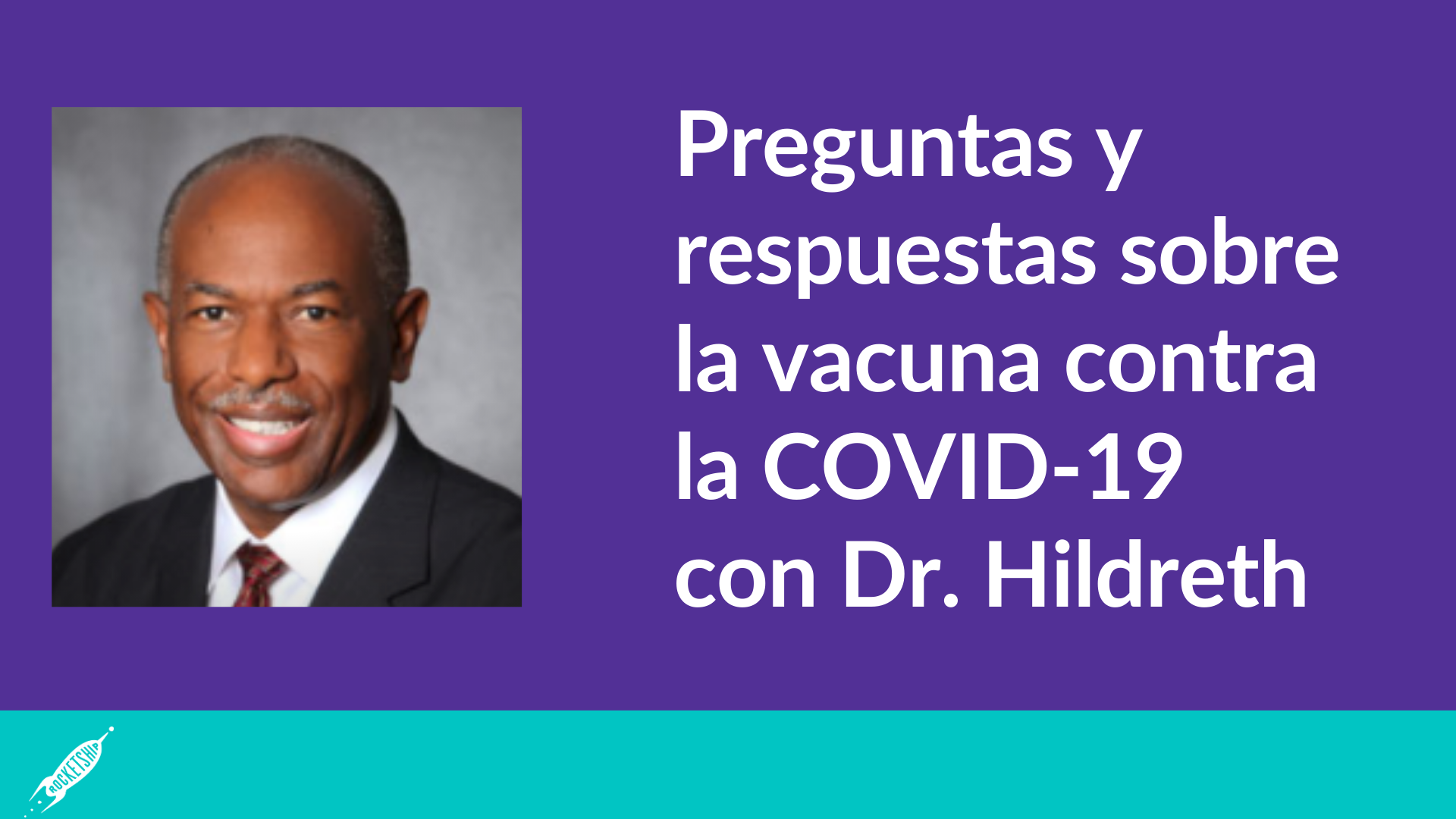Have a question about the COVID-19 vaccine? Dr. James Hildreth answers them
by Beyond Editorial Team
Many of us have questions about the COVID-19 vaccine. At Rocketship we believe it is important to provide members of our community with all the information they need to make informed decisions. Recently, Rocketship was honored to host Dr. James Hildreth, nationally recognized medical expert and member of the Rocketship Nashville Board, to deliver an hour-long webinar on COVID-19 vaccines. .
Dr. Hildreth is the president of Meharry Medical College and is on the FDA Advisory Committee on Vaccines and Related Biologics, which is charged with authorizing the use of all COVID-19 vaccines in the United States. He has also recently joined President Biden’s Working Group on COVID-19 and Health Equality. Dr. Hildreth is frequently in the news due to his experience and work as an advocate for African American communities. In this webinar, you explain the development context of the vaccine and its effects and answer questions from Rocketship staff.
As we find it very interesting, we have decided to make all this information available to the rest of the community, so that we all have the necessary data to make informed decisions when we are eligible to be vaccinated.
Important data to highlight:
- Although COVID-19 has only infected 5% of the population, more than 25% of cases have been detected in the United States. It is believed that for every person diagnosed there are three more people who go undiagnosed.
- As of February 25, 2021, more than 500,000 people have died of COVID-19 in the United States.
- People with pre-existing conditions, such as diabetes, hypertension, cardiovascular conditions, or cancer, are at higher risk of becoming seriously ill and even dying from COVID-19. The percentage of people with chronic diseases is higher among African Americans and Latinos, making these communities the most affected. For example, the African-American population of Louisiana is five times more likely to die from COVID-19 than the Caucasian population. Pay attention to minute 17 of the video for more information.
- For herd immunity to be effective and COVID-19 to stop spreading on such a large scale, 70-80% of the population needs to be vaccinated.
Answers to common questions:
How does the vaccine work?
Click here to hear in detail how vaccines work.
What does the vaccine carry?
The vaccine contains five ingredients: a spike glycoprotein with limited and encoded SARS-CoV2 modified messenger RNA, a combination of charged and neutral lipids (including cholesterol), a neutralizing solution of inorganic salts, sucrose and water. Click here to hear Dr. Hildreth list the ingredients. It also emphasizes that the vaccine does not contain microchips, preservatives, heavy metals (mercury), or cellular or animal products.
How is it possible that the vaccine is safe when it has been developed so quickly?
In the words of Dr. Hildreth, it is true that they developed it fast. However, thanks to technology and the large number of collaborating companies, it only took two months to find the COVID-19 genome, a process that typically takes two years. This helped speed up the process. Click here for a more detailed explanation.
Do vaccines prevent us from getting sick with COVID-19 and getting it from us?
Dr. Hildreth noted that vaccines prevent people from getting COVID-19. However, he also stated that, currently, scientists do not know for sure if it prevents contagion. This means that, once vaccinated, we could get COVID-19 and not get sick, but we could still transmit the disease to others. That is why it is important that we continue to use face masks until the scientists investigate beyond the initial study they did with the trial participants. Click here to hear the full answer.
Are there data on clinical trials conducted with the BIPOC communities (African American and indigenous peoples communities)?
African-American and Latino populations participated in clinical trials of the COVID-19 vaccine. 10% of the participants were African American, between 15 and 30% were Latino, and between 25 and 40% suffered from chronic diseases. Members of indigenous communities did not participate in the trials. African-American physicians and scientists were involved in every step of the process, from the development and licensing of the vaccine to reviewing the data. Click here for more information on this topic.
Does the vaccine protect against virus variants? How likely are we to need a booster dose?
Dr. Hildreth said that he does not think booster doses are necessary, because data at the moment indicate that the current vaccine also immunizes against the variants. Moderna and Pfizer are changing their sequences to fit the variants if necessary. In the worst case, a small percentage of the population may need a booster dose – the first to get vaccinated. For more information on variant strains, Click here.
Do current vaccines protect against COVID-19 variants?
According to Dr. Hildreth, yes. However, several companies are currently working on booster doses to develop immunity against these variants. Dr Hildreth stressed that it is essential that as many people are vaccinated and as soon as possible, because the longer that passes the easier it is for a more harmful variant to emerge that the vaccine may not work against. If that happened, we would have to start over from scratch. For more information on the variants, Click here.
Have allergic reactions to vaccines been observed?
Dr. Hildreth noted that for every 4-6 million people, only one has a severe allergic reaction. Click here to listen to it. He also stressed that no one has died from an allergic reaction. However, people who have severe reactions to anything else should carry injectable epinephrine or their commonly used allergy medication and get vaccinated where they can be treated by medical personnel.
Should I wait to get vaccinated? Is there a difference between current vaccines?
Dr. Hildreth believes that the two currently available vaccines are identical. There are people who have stronger reactions to the second dose, but that indicates that the body is developing immunity to fight the virus. Click here to listen to it.
Has the COVID-19 vaccine caused deaths?
According to Dr. Hildreth, no one has died from COVID-19 vaccines.
Will we have symptoms like COVID-19 after getting vaccinated?
Dr. Hildreth noted that the vaccine does not contain COVID-19, so it does not cause such symptoms. If they have symptoms of COVID-19 after they have been vaccinated, they may have a cold or the flu. Here’s what Dr. Hildreth says about it.
If someone has had COVID-19, do they have to get vaccinated?
Dr. Hildreth said yes, as scientists are unsure whether passing COVID-19 immunizes and prevents re-infection. There have been cases in which someone has been infected with COVID-19 multiple times. Click here for more information.
If I have had COVID-19, how long should I wait to get vaccinated?
Dr. Hildreth advises waiting at least a few weeks and up to three months to fully recover before getting vaccinated to ensure that the body responds to the vaccine. The CDC recommends waiting three months to ensure that the body responds to the vaccine. Hear the reasons here.
Is the vaccine safe for pregnant and breastfeeding women?
Dr. Hildreth says 27 women who became pregnant participated in the Pfizer study, and advises pregnant women to get vaccinated. Listen to it here. You can also get more information on this topic in this link..
And the vaccination of children? When will they start to be vaccinated?
It is quite likely that children will not be vaccinated until the end of this year or the beginning of the next. Click here to obtain more information.
Aside from answering these questions, Dr. Hildreth shared much more helpful information. We have tried to highlight the key points and possible doubts you may have, but we recommend watching the entire video to hear it first hand. We hope you find this seminar useful! You can share it with friends or family who have questions about COVID-19 vaccines.
Published on March 11, 2021
–


